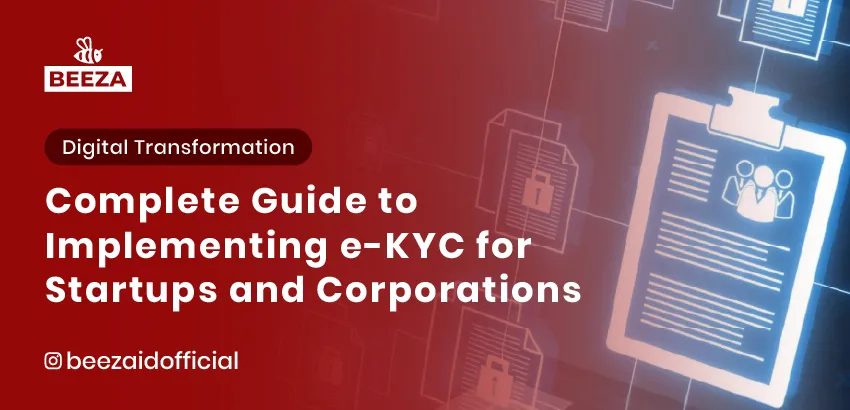
Introduction: Implementing eKYC for Startups
In the increasingly digital era, fast, secure, and efficient customer identity verification has become a critical need for businesses, from startups to large corporations. The long, error-prone manual verification process can now be replaced by eKYC (electronic Know Your Customer) technology, which allows digital identity verification.
This article provides a comprehensive guide to implementing eKYC for both startups and corporations. We will discuss what eKYC is, its benefits, and the steps necessary for successful implementation.
What Is eKYC?
eKYC is an electronic process used by businesses to verify customers’ identities digitally. Through technologies like facial recognition, fingerprints, document scanning, and biometric verification, eKYC systems enable companies to ensure that customers are who they claim to be, without the need for face-to-face meetings or physical document checks.
Benefits of Implementing eKYC
1. Higher Security
eKYC enhances security by utilizing biometric technology, which is harder to counterfeit compared to manual verification methods, such as copies of ID cards or registration forms.
2. Improved Customer Experience
The quick and easy identity verification process enhances the customer experience. Customers can complete the verification process in just a few minutes, minimizing friction during onboarding.
3. Reduced Operational Costs
By replacing manual verification processes, eKYC reduces the need for verification staff and physical document storage, ultimately lowering operational costs.
4. Regulatory Compliance
eKYC helps businesses comply with increasingly stringent data protection regulations, such as GDPR in Europe or PDP Law in Indonesia. Customer data is encrypted and managed securely, in line with applicable regulations.
5. Scalability for Business Growth
eKYC allows businesses to scale easily without the need for additional human resources or physical infrastructure. This technology enables companies to serve customers from various locations efficiently and uniformly.
Steps for Implementing eKYC for Startups and Corporations
1. Choose the Right eKYC Technology
Choose eKYC technology that suits your business needs. Some key features to consider include:
- Biometrics: Such as facial recognition, fingerprint scanning, and voice recognition.
- Document Recognition: Systems that can verify ID documents such as ID cards, passports, and driver’s licenses.
- Liveness Detection: To ensure that the biometric data is coming from a live individual, not a manipulated image or video.
2. Evaluate Compliance Requirements
Before implementing eKYC, ensure that you evaluate and understand the regulations in the countries where you operate. For example, in Indonesia, you need to comply with PDP Law regarding the management of personal data.
3. Integration with Existing Systems
eKYC should integrate with your internal systems, such as CRM (Customer Relationship Management) or payment platforms. This allows the verified data to be used across various services in your organization.
4. System Testing and Validation
Before fully deploying eKYC, conduct system testing to ensure that identity verification can be done accurately and securely. Test different scenarios, such as low lighting, face mask usage, or unclear documents.
5. Staff and User Training
To ensure eKYC runs smoothly, it’s crucial to train your internal staff involved in the verification process. Additionally, make sure users understand the digital verification process and feel comfortable using it.
6. Enhanced Security and Monitoring
To maintain system security, use encryption for customer personal data and conduct regular security audits. Close monitoring of potential security gaps is also important, given the evolving cyber threats.
Challenges in Implementing eKYC
1. Security Challenges
Although eKYC offers higher security, biometric and identity data remain vulnerable to hacking if not properly managed. Therefore, implementing data encryption and strong security technologies is essential.
2. User Experience
Some customers may feel uncomfortable with the digital verification process due to privacy concerns or a lack of understanding of the technology. Therefore, businesses must provide clear education and ensure the process is easy to follow.
3. Initial Implementation Costs
While eKYC reduces operational costs in the long run, there are initial costs involved in system implementation, testing, and training. However, the long-term benefits of efficiency and enhanced security will offset these costs.
Case Studies: eKYC Implementation Across Industries
1. Fintech
The fintech sector greatly benefits from eKYC as it allows for rapid customer onboarding, enabling quicker account openings and digital transactions. Additionally, eKYC helps ensure compliance with anti-money laundering (AML) and counter-financing terrorism (CFT) regulations.
2. Telecommunications
In the telecommunications industry, eKYC is used to verify identities when customers purchase SIM cards or register for digital services. This helps prevent abuse and identity theft.
3. E-commerce
eKYC is used to verify the identity of both sellers and buyers on e-commerce platforms, ensuring that transactions are conducted by legitimate parties and preventing online fraud.
Conclusion
Implementing eKYC offers numerous benefits for startups and corporations, from improved efficiency to reduced fraud risks and operational costs.
By following the proper steps in implementing eKYC, businesses can ensure that their identity verification processes run smoothly, quickly, and securely. This technology also allows companies to expand their market reach, serve customers from different regions, and meet increasingly stringent regulatory requirements.
🔹 Interested in implementing eKYC for your business? Contact Beeza for the best digital identity verification solutions and optimal data protection!